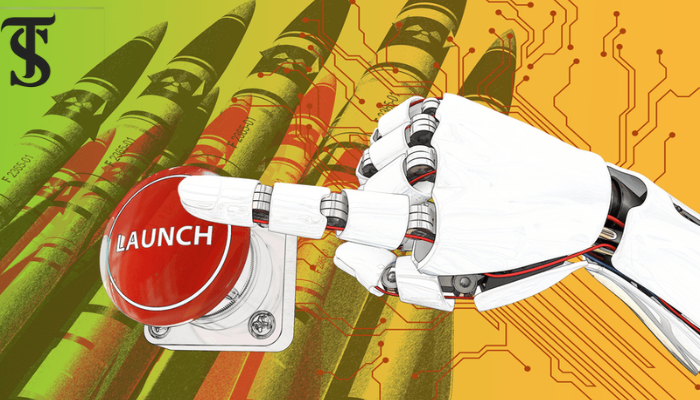Artificial Intelligence (AI): The Death of Human Creativity

- AI's Transformative Impact: AI is revolutionizing global dynamics by automating tasks, reshaping industries, and influencing international power structures.
- Challenges for Developing Nations: Countries like Pakistan struggle to keep pace with AI advancements, facing economic and creative setbacks.
- Balancing Innovation and Creativity: A harmonious future depends on integrating AI with human creativity to enhance, not suppress, ingenuity and artistic expression.
Artificial intelligence (AI) has emerged as a disruptive force on the global stage, reshaping the future in ways once reserved for science fiction. It is now no longer a distant concept but an active reality that is changing the fabric of everyday life. As AI takes over routine tasks, led by machines, robots, and algorithms, we are witnessing a paradigm shift in how we work and interact with technology. The digital roadmap promises to elevate society to new heights, where unexpected moments of joy bring collective harmony and tranquility. However, as we venture into this future, one must pause and imagine a world where AI not only supports human efforts but overtakes them, reducing creativity and innovation in the process.
AI’s role in society is not just about preserving the past but also about fostering a dialogue between traditional values and modern expression. However, countries like Pakistan, which have made less contribution to the development of cutting-edge technology, find themselves struggling to keep pace. Productivity in such nations has faltered, as AI and other technological advancements leave them behind. From a local, global, and policy perspective, the questions arise: What does the future hold? Is the world entering a bipolar or multipolar phase, or does the United States still hold global sway in shaping AI’s trajectory?
In the years to come, artificial intelligence will likely take center stage, not just in business and technology but in diplomacy as well. The ongoing advancements in AI have already altered the power dynamics on the global stage, leading to new avenues for influence and control. As AI progresses, it also ushers in a shift away from human creativity. Science, in its quest to automate and optimize, has stripped away much of the creative liberty that young innovators once cherished. This technological onslaught has been particularly damaging for nations like Pakistan and India, both nuclear powers with a history of conflict and rivalry.
Over time, the pursuit of power in these countries has led to the creation of tools that further fuel political and military tensions, shifting perceptions and altering the course of history. Today, with the rapid flow of information, we often talk about how global issues like climate change are reshaping Pakistan’s economy and public consciousness. Unfortunately, the information overload we experience today has led to fragmented attention spans, leaving us less informed and more reactive than ever before.
The modern knowledge economy has a common denominator in the way we absorb information. To succeed in the digital age, we must unlearn outdated ways of thinking and relearn how to navigate this tech-driven world. The rise of AI brings with it the pressure to become digital celebrities, leveraging platforms for brand endorsements, launching product lines, and participating in free trials. In doing so, we move further away from the creative, imaginative, and artistic impulses that once drove innovation. AI’s role in shaping our future often feels like a double-edged sword, promising progress while stifling the very qualities that make us human.
AI stands at the forefront of technological advancement, far surpassing other mediums in shaping the future of the globe. Companies like Google, with its mission to organize the world’s information and make it universally accessible, and Elon Musk’s ventures—including SpaceX, Tesla, The Boring Company, and Neuralink—are leading the charge to integrate AI with human life. Autonomous vehicles, the Starship rocket, the Internet of Things (IoT), the James Webb Space Telescope, the humanoid robot Yolanda in Singapore, and the growing use of virtual reality (VR) in education are just a few examples of how AI is set to revolutionize the world.
The Earth’s age, nearly 4.5 billion years, tells a story of cosmic evolution—from the Big Bang to the creation of galaxies, stars, and planets. This incredible journey, marked by scientific advancements and cosmic events, is not an isolated or extraordinary occurrence but a part of the tangible, ongoing reality of our universe. In the same way, AI’s evolution will eventually render much of what we know today obsolete, with generational divides becoming less significant as technological progress continues to unfold.
AI does not merely skim the surface; it delves deep into the complexities of human experience, understanding the emotional and psychological layers that shape our perceptions. Yet, the world today seems overwhelmed by a flood of mediocre ideas, with creativity and imagination sidelined in favor of tech-driven solutions. Countries around the world are collaborating on the development of electronic devices and AI-powered machines, hoping to promote international cooperation and geopolitical stability. However, in doing so, we risk losing sight of the importance of creativity, as AI continues to push artistic expression and human ingenuity to the periphery.
It is time to bring creativity and AI innovation together, recognizing that both can contribute to shaping the future. By fostering a generation that is both digitally aware and creatively inspired, we can build a more balanced future where technology enhances rather than suppresses human potential. AI’s influence should not come at the cost of human creativity but should instead serve to amplify it, making space for both innovation and artistry to coexist.
The views and opinions expressed in this article/paper are the author’s own and do not necessarily reflect the editorial position of The Spine Times.
Rakhshanda Zahir
The author is a 5th-semester Journalism and Mass Communication student at the University of Peshawar. She has authored A Nostalgic Silence and co-authored three anthologies: Dreams and Delusions, Every Woman is Exceptional, and Whispers of Today.





